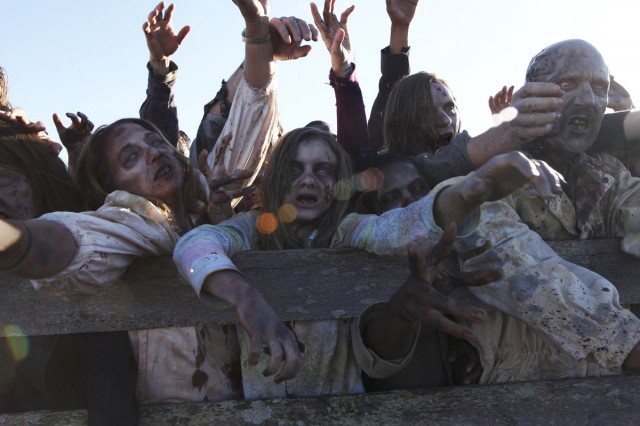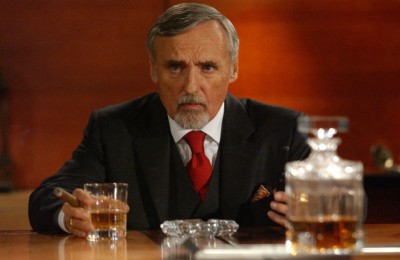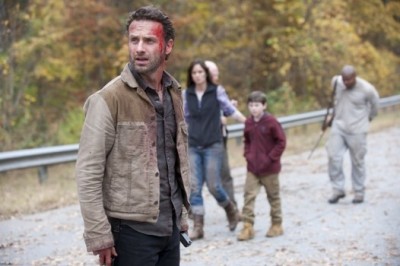Citigroup CEO Resigns: What You Need To Know
Citigroup CEO Vikram Pandit suddenly resigned this morning, which is a very big shock to the people who follow this kind of thing. But how does this affect you, the Citi consumer account holder? You still have to pay your credit card bills, sorry.
Mitt Romney Given "Real Boy" Lessons
“Aides are sufficiently satisfied with the content of Romney’s answers that practice sessions for the second round have focused on the stagecraft and body language of engaging with the questioners. Romney has been warned not to physically back away from a questioner, but to lean in as if having a one-on-one conversation that just happens to have 70 million eavesdroppers.”
Flea Is 50
Michael Peter Balzary, who wrote what is inarguably one of the greatest basslines of all time, turns 50 today. It might be hard for younger readers to believe this, but there was a time when his band, the Red Hot Chili Peppers, had an astounding amount of credibility (Blood Sugar Sex Magik was released on the same day as Nirvana’s Nevermind, and people who are now old were equally excited at the time for both). The Chili Peppers’ cachet has long since disappeared for various reasons which, not being a music historian, I can’t fully explain (although even I have not listened to anything they’ve done since Blood Sugar Sex Magik; my theory is that the advent of rap-rock somehow gave them ridiculousness-cooties by association, although the latitude for misogyny and immaturity you will give to a young band (see also: Beastie Boys) grows smaller and smaller with each successive release, and that probably had a lot more to do with it), but the fact that a guy who used to wear a dick on his sock is now one of the elder statesmen of whatever we’re calling the kind of music they do these days certainly says something. Anyway, happy birthday, Flea.
Mitt Romney Will Listen To You All Night Long
“A Republican familiar with Romney’s internal polling and focus groups told us: ‘What women saw in Obama is kind of the interesting but arrogant guy that turns them off.. … What they saw in Mitt was a reliable father. He showed women that he’s a listener. Obama in the first debate was the husband who says: ‘That’s your problem? Here’s the solution.’ Mitt was the husband who says: ‘Well, you, know I’ve been thinking about this. I’ve got some ideas. You wanna talk about them?’ Women want to know that you listen to them.’”
Today: Jewels and Furniture and the Constitution and CMJ
Christies and Phillips de Pury! Orhan Pamuk at BAM. Linda Greenhouse and Akhil Amar on “America’s working constitutional system.” Also the President is allegedly going to show up to debate Mitt Romney tonight. And CMJ starts. MORE LIKE TMJ, AM I RIGHT?
We, The People, Against The Zombies
by Mike Barthel

The first in a series about monsters happening here through Halloween.
As usual, Tina Belcher put it best: “I’m not a zombiephile. I have a complicated relationship with zombies.” Over the last decade, the pop-culture status of the undead has moved from “niche obsession” to “passé,” inasmuch as a type of monster can be passé. Admit to an interest in certain quarters and you might as well be wearing a t-shirt that says, “Hi, I’m three years behind the times.” Then there’s the question of why so many zombie stories have been unleashed in the past few years: Why do so many of the undead walk among us these days? As some pointed criticism has explored, including this review, zombie stories are rife with survivalist themes. In this light, the stories aren’t just about the thrill of fighting off the brain-eating dead; they’re also xenophobic parables of isolation and of the necessity (and righteousness) of violence in the face of scarcity.
Certainly, such worrisome impulses may be at the heart of fans’ embrace of zombie fiction. It can be disheartening to hear complaints that there is too much talking on the AMC show “The Walking Dead” (you got talking in our killing!). But the show, which had its third-season premiere last night, highlights one other interesting thing about zombie stories: the ways in which they can enact little thought experiments about politics.
Princeton political scientist Daniel Drezener has used the scenario of a worldwide zombie outbreak to explain different theories of world politics, and his choice of those particular creatures is not accidental. Over that same decade in which zombies have surged in popularity they have been increasingly depicted as agents of an apocalypse, less a monster than a societal condition. When George Romero made Night of the Living Dead in 1968, the zombies came about because of an isolated event, radiation from a fallen satellite; their attack was a temporary crisis for the main characters, one that is brought to a conclusion by the intervention of the police. But in Max Brooks’ two books, Zombie Survival Guide (2003) and World War Z (2006), Robert Kirkman’s The Walking Dead comic-book series (first out in 2003, and the source material for the TV show), and Romero’s own Land of the Dead (2005) — and, to a certain extent, Danny Boyle and Alex Garland’s 28 Days Later — the police are no match for the zombies. The government is overwhelmed, and the survivors are left to self-organize in whatever ways they can make work. After immediate survival is secured, other concerns come into play for survivors: how to work out conflict, how best to meet the group’s needs over the long term, and who should make decisions. If the wrong choices get made, the consequences are swift. The space this opens up is one in which we can consider the basic functions of government and the nature of justice while also getting all the gore that makes zombie movies fun.
Most of the people I know have zombie contingency plans. One friend has gone so far as to design a Google map with important spots marked out — a good place for food, for weapons, for supplies, for transportation — along with the best escape route out of the city, leading to an isolated location upstate. My plan is to band together with skilled friends and hold a secure location somewhere cold. My wife’s, somewhat distressingly, assumes that I am dead, in which case she puts my wedding ring on a necklace and rules over a tribe of bandits like Tina Turner. I’m not sure any of us actually believe we’d survive awfully long; if it’s been more than four hours since I last ate I lose the ability to make decisions, and if you were able to read The Road without roping all your loved ones into a suicide pact, you’re made of stronger stuff than me. But thinking about these scenarios gives us the chance to consider how we see ourselves getting along with others in the absence of a government — or any institution that provides penalties for bad behavior.

In other words, zombie apocalypses put us in what Enlightenment political philosophers called the “state of nature,” the condition that exists before any sort of government is formed. Different thinkers have used the idea in different ways. (They’ve used zombies, too.) John Locke, for instance&mdasy;with whom you may be familiar with from the television show “Lost” — saw the state of nature as being governed by Christian morality, with monarchy as a perversion of the natural order that could only be restored through democracy. That’s roughly equivalent to the scenario Max Brooks lays out in World War Z. In that book, individual acts of heroism in the midst of the crisis prove an inspiration to others, as when an Australian astronaut stays in space for years to help direct eradication efforts, even though it means his slow disintegration. Yet ultimately, the efforts of individual survivors prove less important than the coordinated efforts of governments. Jean-Jacques Rousseau, on the other hand, saw the state of nature as an ideal that modern society has corrupted, roughly the view of Romero’s Land of the Dead, in which Dennis Hopper’s attempts to form a new society after the zombie apocalypse fail are defeated when his subjects rebel against his corrupt rule. And philosopher John Rawls’ “original position” thought experiment asked readers to put themselves in a position that’s roughly equivalent to the one described in zombie narratives: at the start of a world in which you couldn’t know what your status would be. How would you want that world to be arranged? You see that in something like Shaun of the Dead, where characters maintain the proper British liberalism even in the face of looming societal collapse: rather than abandoning the weak, as happens in Brooks’ vision of the zombie apocalypse, Shaun collects the people he loves and brings them to the public space of the Winchester pub.
Running through almost all zombie stories is the pessimism of Thomas Hobbes, who called the state of nature “nasty, brutish, and short.” Hobbes argued against natural law, the idea that humans have an inborn tendency toward acting morally, favoring instead structured bulwarks against the wars humans inevitably start. And in the more advanced post-zombie societies, you tend to get something like Robert Nozick’s libertarian view of a government that provides minimal protections, allowing individuals to structure arrangements between themselves.

In the televised version of “The Walking Dead,” the main group of survivors, led by former sheriff’s deputy Rick Grimes, tries out a few different political arrangements. (If you haven’t yet caught up on the show, be warned: Spoilers here.) As the series begins, the gang is in a sort of family-tribal state of nature. Shane, Rick’s best friend and co-deputy, and Lori, Rick’s wife, thinking Rick dead, rule as patriarch and matriarch over a group of survivors who, feudal-like, have sought Shane’s protection. Shane, though, is ruthless: when some of the group find themselves trapped, he refuses to send help. Rick arrives and assumes the leadership position, setting off a struggle for power between the two. But rather than being vicious open conflict, it’s more of a cold war: at one point Shane sights Rick in his rifle, but declines to shoot. (Very Cuban missile crisis.) A parliamentary system is inaugurated, with Rick as the executive, others acting as the bickering legislature (Shane, Lori, Dale), and the rest as voters being lobbied for support.
Once Rick’s in the picture, the first season tilts in favor of classic democracy. When the main group meets a seemingly cutthroat gang in Atlanta, Rick initially takes a hostile, Shane-like approach, threatening war. But once he and the other group’s leader have a rational conversation, Rick discovers that the cutthroats are actually trying to sustain a nursing home, a textbook lesson in the civil libertarian dictum of respecting the rights of people outside your immediate group. At the end of the season they even put all their hopes and dreams into finding a remnant of the old civil society: the Centers for Disease Control, where they hope to find a cure for the disease. But when they finally make it there, the government can’t help them. The lone remaining scientist admits failure, before trying to destroy the building.
In the second season, the group reaches a rural farm seemingly unaffected by the zombie outbreak and occupied by a friendly group of survivors. There, they encounter a different model, a Rousseauian idyll that discourages conflict in favor of living in harmony with nature. But midway through the season, zombies are discovered in the barn, and only Rick’s group is able to step up to the task and defend the farm against the threat by killing the walkers — a nice critique of the very real problems with Rousseau’s approach (i.e., that nature tends to be Hobbesian whether you want it to be or not). And at the conclusion of the second season, Shane’s death prompts Rick to institute a very different type of leadership, one much more indebted to the strong leaders that people like Hobbes or Machiavelli would endorse as a necessary part of bringing order to the chaos of nature. “This isn’t a democracy anymore,” he snarls. Indeed, the final arc of that season dealt explicitly with the instability of having contested leadership in the group. That was the dynamic that played out in last night’s premiere, with Rick making firm, decisive moves to clear out a zombie-infested prison, and actively resisting others’ objections to his strategy.
And so this season, the show will most likely explore the strengths and weaknesses of that approach, just as the successes and problems the group encountered over the previous two seasons have served as implicit critiques of whatever political structure they were using at the time. The results so far haven’t been encouraging. The very American liberal-democratic approach Rick tries through the first two seasons, indebted to Rawls and Locke, proved inadequate to the task: his indecision and attempts to please both zombie hawks and doves led to a stasis that left the group vulnerable to the zombie hordes. The farm and its family life, as thoroughly a natural state as Rousseau could’ve wanted, couldn’t hold back the persistent threat of death, which eventually overwhelmed Rick and his little polis. Rick now is Hobbes’ leviathan, a monstrous figure who rules society with an iron fist so brutish nature might be kept at bay. This would not seem to be an endorsement of any democratic ideal, but in a weird way, it is. Hannah Arendt, who might as well have been talking about zombies when she coined the phrase “the banality of evil,” argued that organized democracy isn’t possible as long as people’s material needs for food, shelter, and protection weren’t met; we can’t deliberate when we’re worried about where we’re going to sleep, or about having our guts ripped open by zombies.
That’s the question going forward: do zombies make democracy impossible? Sure, it’s always tempting to find some political fault in the kind of art people like. But in the case of zombie narratives like “The Walking Dead,” there’s a fairly good reason why they’ve gotten so popular in the past decade: creators have figured out a new kind of story to tell with them, opening up narrative possibilities that simply didn’t previously exist. Zombie stories can now be stories about how we organize ourselves.
Mike Barthel has a Tumblr. Top photo from Season 2 finale of “The Walking Dead” by Gene Page/AMC.
Lack Of GOP Primary Rubber Masks Ruins Bad Group Costume Idea

We had a great idea for a “group costume” you could do with some friends from work or the therapy group or whatever, but a quick yet exhaustive search on eBay shows there are no Halloween masks for Michele Bachmann, Rick Santorum, Ron Paul, Rick Perry, Herman Cain or the rest of them (the “other Mormon,” Buddy somebody?). Other than the actual candidate, Mitt Romney, the only GOP Primary figure available in weird rubber mask format is Newt Gingrich. And his mask dates back to when he was Speaker of the House, in the 1990s, and people otherwise uninterested in politics were briefly fascinated by the whole Clinton impeachment thing, because it involved blowjobs.
Just add an ill-fitting suit and a handful of Newt Gingrich books from the remainders bin, and you’re ready for a night of … well not “fun,” exactly, but something. Something weird and sinister, like Halloween itself.
It’s a little bit sad that these once beloved news characters are forgotten so quickly. Think of all the emotional involvement people supposedly had with Herman Cain. And then whoosh, even if there was a Herman Cain mask, people would have no idea who you were supposed to be. “Eddie Murphy from Bowfinger? Great movie, which one is Steve Martin?”
And then you could nod to the person in the Newt Gingrich mask and say, “That one. That one is Steve Martin.”

New York City, October 14, 2012

★★★★★ Discouraging morning clouds fell away; the angel of the Lord laid aside his flaming sword and reopened the gates of Eden. Air flowed between cool sunshine and balmy shade. In the courtyard, the black infinity pool had been lowered into the finite, so the rounded river stones boxed inside it stood out pale above the waterline, like cobbles in a genuine spillway. Its sideways floodlights lay two-thirds exposed, flecked with the green of oxidation, little live chemical reactions. House sparrows flitted in over the stone wall, splashed in the water. Male and female, ink-droplet breast and dun-striped eye. The breeze slipped its way through hair and moved over the nerves of the scalp. All up the tower’s sheer, mirrored facade were the dark bars of windows tipped out and open to let the breeze inside. The breeze tossed the bamboo, played through the seed heads of the ornamental grass. Up the street and around the corner, the playground was full of children, lining up for a turn at the swings, lining up to swing from the ring bridge. Come mid-July, expect to see a whole batch of new ones.
Yes, Virginia

There is a gender wage gap.1
There is a real world.2
There is poop in your well.3
There is hope.4
There is a G-Spot.5
There is a Bob Hope.6
Regular folks can be taught to code.7
Black love still exists.8
Macy’s stock is a good value
Even near highs.9
Native Americans do pay taxes.10
The rich pay less tax now.11
It is Bernanke’s fault.12
There is racism on the island.13
There is a Prince Harry nude video.14
There really is Modern Monetary Theory.15
There is an Oscar, and oooof! — has he got the hots for you!16
There is a magenta.17
There is an Agnes.18
There is a Madman.19
There are many devils in a devilish world,
But those kitchen sinks belong in another room,
And please keep them there.20
1 The Nation, “Yes, Virginia, There Is a Gender Wage Gap” [source]
2 Proceedings and Addresses of the American Philosophical Association, “Yes, Virginia, There Is A Real World” [source]
3 High Country News, “Yes Virginia, There Is Poop In Your Well” [source]
4 Financial Analysts Journal, “Yes, Virginia, There Is Hope: Tests of the Value Line Ranking System” [source]
5 FoxNews.com, “Fox on Sex: Yes, Virginia, There Is a G-Spot” [source]
6 Bob Hope: A Life In Comedy, William Robert Faith [source]
7 Wired, “Yes, Virginia, Regular Folks Can Be Taught to Code” [source]
8 Black World/Negro Digest, Oct 1973 [source]
9 Forbes, “Yes, Virginia, Macy’s Stock Is A Good Value Even Near Highs” [source]
10 Huffington Post, “Yes Virginia, Native Americans Do Pay Taxes” [source]
11 The New Republic, “Yes, Virginia, The Rich Pay Less Tax Now” [source]
12 Huffington Post, “Yes, Virginia, It Is Bernanke’s Fault” [source]
13 The Root, “Race in Cuba: Yes, Virginia, There Is Racism on the Island” [source]
14 Gawker, “Yes, Virginia, There Is A Prince Harry Nude Video” [source]
15 FT Alphaville, “Yes Virginia, There Really Is Modern Monetary Theory” [source]
16 Spy, “Blurb-O-Mat” [source]
17 Ars Technica, “Yes, Virginia, there is a magenta” [source]
18 Nieman Reports, “Yes Virginia, There Is an Agnes” [source]
19 Horror Films of The 1980s, John Kenneth Muir [source]
20 The New York Review of Books, “An Exchange on Post-Industrial Society” [source]
Previously: If I Weren’t An Actor…
Elon Green is a contributing editor to Longform.
Gucci Mane, "The Truth"
Sigh (and a queasy sort of “yay!”): Here we go again. Another one of the best rap songs of the year is a threatening “beef record.” Seven years ago, a pair of Atlanta drug dealer/rappers named Gucci Mane and Young Jeezy recorded a song together called “Icy.” It was a big hit, but then the two had a falling out over credit. Jeezy recorded a diss record called “Stay Strapped,” putting a $10,000 bounty on Gucci’s “So Icy” chain. Soon thereafter, four armed men burst into the apartment of a woman Gucci was visiting. Gucci shot and killed one of them and was arrested on murder charges, which the D.A.’s office eventually dropped because Gucci was acting in self-defense
. Three years ago, a mutual friend to both rappers, DJ Drama, engineered a burying of the hatchet. But, as will happen, tensions have again flared. And Gucci Mane has recorded a chilling, thrilling song about it.
